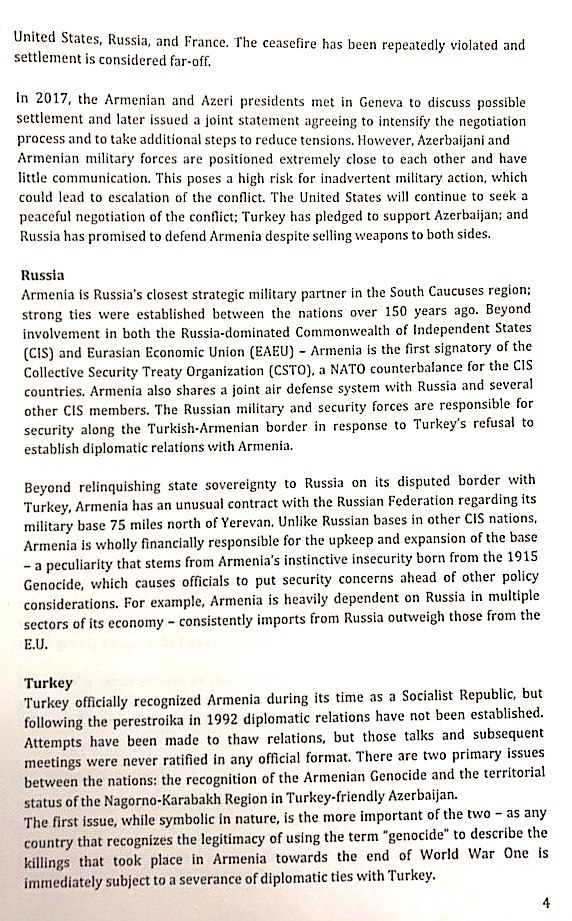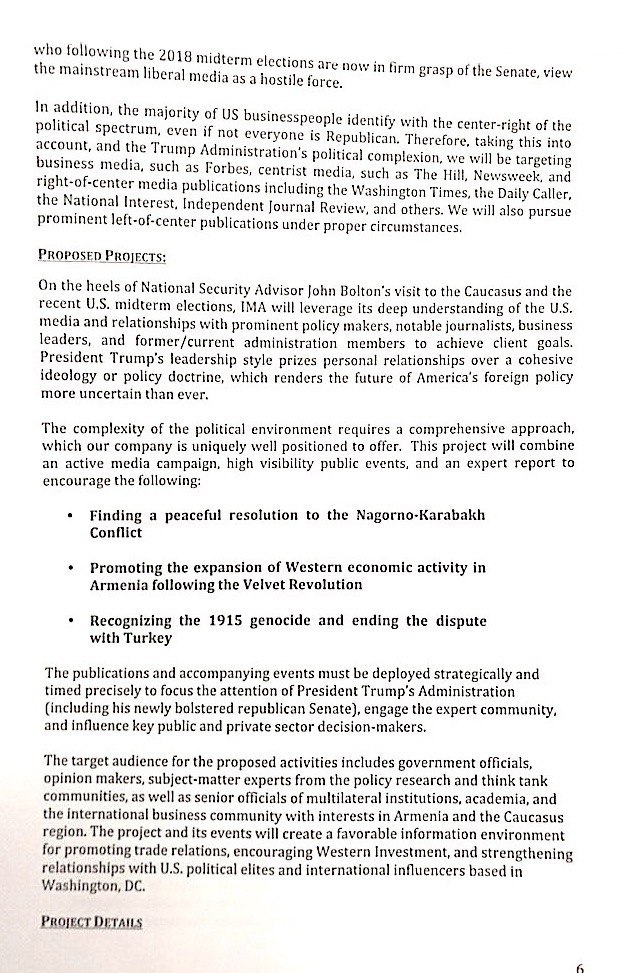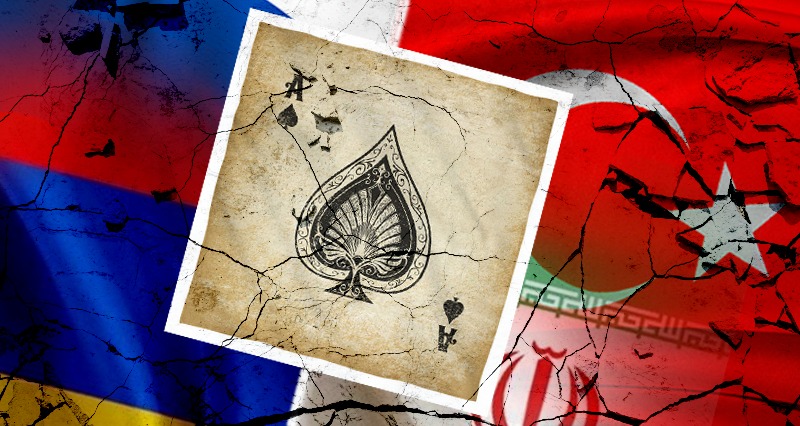A source close to a U.S. NGO has handed to the UWI a secret plan devised by the U.S. globalists for triggering a spate of tensions among Iran, Turkey, Russia, and Armenia.
Certain globalist quarters in the U.S. find the success of consultations and decisions on developments in Syria taken in the format of the Astana troika (Russia, Turkey and Iran) to be highly disconcerting, as it undermines their strategic objective of colonizing Syria.
As these quarters watch the inefficiency of Trump’s sanction baton and pressures on Turkey and Iran, they have drafted a smart strategic plan based on the principles of destructive activities for destabilizing the situation around Ankara and Teheran through the igniting of tensions in Armenia’s relations with Iran and Turkey.
In spring 2019, the Armenian government commissioned an analytical review of its economy to the U.S. company International Market Analysis (IMA). The major goal was to obtain a high-quality independent and unbiased analysis of the economic situation in the region, as well as recommendations on the country’s development.
The problem, however, is that the IMA is not independent in any way. It is an umbrella organization for the globalism-oriented U.S. government circles that use it as a tool for meddling in the internal policies of third countries in a pursuit of their own interests.
Dr. Ariel Cohen, the head of the IMA, formerly known as Valery Kogan, a citizen of the USSR and Israel, emigrated to the U.S. in 1989. He has worked as a consultant for the U.S. Senate foreign relations committee, the House of Representatives committees for the armed services and justice, and the commission for security and cooperation in Europe of the U.S. Agency for International Development. He has also acted as an advisor for the World Bank and the Pentagon and has given courses of lectures for the CIA. As of 1992, Cohen is a member of staff at the Leonard Davis Institute for International Research and the Heritage Foundation where he supervises the research program for Russia and the Commonwealth of Independent States.
Given Cohen’s service record, it is highly unlikely that the nongovernmental organization IMA will do an independent, unbiased and correct analysis of the economy for Armenia, which has close and deep-rooted political ties with Russia and Iran, both of them opponents of the U.S.
U.S. globalist circles that use the IMA as a cover-up for their intentions are issuing recommendations to Armenia on how to overcome its domestic and economic problems.
It might seem that there could nothing loftier than a great democratic nation sharing the experience in overcoming difficulties – unless it is shared for the purpose of destabilization in the region.
“If handled skillfully, the government of Armenia can leverage these developments to improve its geo-economic and geopolitical situation,” the document claims. “For this to be successful, however, Armenia’s challenges must be elevated into the dialogue of Washington D.C. decision makers and the Western public at large. This cannot be achieved without a concerted public education and strategic communications campaign in the USA.”

The authors of these recommendations or, rather, the U.S. state agencies standing behind them dictate and obtrude their vision of Armenia’s success and development on that country. The key to them is doing everything as directed by Washington, obviously inclusive of the sphere of state secrets. The U.S. de facto tells Armenia openly: “Do everything as we tell you and you’ll be successful.”
The U.S. globalist quarters have relentlessly tried to use a similar method of wielding influence on Turkey through FETO outlets but the abortive coup of 2016 showed that far from all the scenarios could be tried out on the Turks.
It is well known that President Erdogan’s current stance on a number of international issues exasperates the U.S. The Turkish-U.S. crisis is deepening to the degree that the House of Representatives has adopted a bill on sanctions against Turkey.
The House passed a bill to condemn Turkey's invasion on Syria and impose sanctions on Turkish officials. It passed 403-16. The only Democrat to vote against it was Ilhan Omar.https://t.co/wGKBCUHHUG
— Ben Jacobs (@Bencjacobs) October 29, 2019
Nonetheless, IMA analysts are in the vanguard and they have decided that there can more efficacious ways of cutting Turkey’s dignity in the international arena down to size than hurling sanctions at Ankara. Namely, Turkey should be forced to sign a resolution on the genocide of the Armenians that would be favorable for Armenia.
“Popular sentiment in Europe and the West is against Turkey’s rising Islamism, and its denial of the 1915 Armenian genocide,” the IMA recommendations say. “Armenia must continue to build on this global momentum by aggressively utilizing all information channels – from media to academic reports to expert panels – to deliver its message of Ankara’s responsibility for the genocide and to reach an acceptable resolution.”

The Washington-based analysts claim that Armenia’s ties with Russia and the small political weight put an obstacle for the Armenian government’s efforts to get international assessment of the Ottoman genocide of the Armenians in 1915. Quite naturally, the globalist milieus recommend initiating global recognition of this genocide.

Pages 4 and 5 of the report contain the following passages.
“Turkey official recognized Armenia during its time as a Socialist Republic, but following the perestroika in 1992 the diplomatic relations were not established. Attempts have been made to thaw relations, but those talks and subsequent meetings were never ratified in any official format. There are two prime issues between the nations: the recognition of the Armenian Genocide and the territorial status of the Nagorno-Karabakh region in […] Azerbaijan.
“The first issue, while symbolic in nature, is the more important of the two – as any country that recognizes the legitimacy of using the term “genocide” to describe the killing that took place in Armenia towards the end of World War One is immediately subject to a severance of diplomatic ties with Turkey.
“Turkey’s regional power and strategic importance is allowing it to leverage this issue until resolution. Armenia’s limited strategic influence and dependency on Russia prevent it from gaining major “official” international recognition on the issue.”

It is well known that Armenia is one of the few post-Soviet countries, which has retained very strong and friendly economic relations with the Islamic Republic of Iran.
The IMA report says in unambiguous terms Armenia should not keep up friendship with Iran that is an important trade partner for it, since the U.S. promises to make up for the absence of Iran in the Armenian market of energy resources with the American ones – most probably, shale gas – if Yerevan throws its support behind the U.S. sanction drive.
The document recommends Armenia’s rapprochement with the U.S. in detriment of bilateral relations with Tehran, as well as an escalation of the conflict with Turkey. This is needed, in part, for a maximum advancement of the U.S. economic presence in the republic.
Specifically, the IMA says the following:
“In October 2018, John Bolton, National Security Advisor of the United States, visited Yerevan to push compliance with re-imposed sanctions on Iran. Bolton offered closer economic ties with the United States, calling it “a good friend in the region”. Armenia’s willingness to cooperate with the United States vis-à-vis Iran is complicated by their existing friendly relationship.
“Because Armenia is a landlocked nation and does not have diplomatic relations with neighboring Turkey or Azerbaijan, it therefore must retain amicable relations with Iran and Georgia. These are Armenia’s sole gateways to the outside world. If Yerevan adheres to U.S. sanctions, Armenia would have only Georgia as a neighboring trade partner. Improved diplomatic and economic relations with the West, however, could greatly mitigate the loss of Iran as a partner.
“Overall, the establishment of a new Pashinyan government reflects social and political change. But, the government has to waste no time engaging the most influential factors of domestic economics and international relations.”
De facto, the globalist quarters in Washington are striving to wield impact on Armenia’s domestic and foreign policy and to sow discord in Yerevan’s bilateral relations with its strategic partners, Iran and Russia, as well as with the Republic of Turkey, its closest neighbor.
THE STEPS IMA RECOMMENDS FOR ARMENIA
The IMA says it will use Bolton’s visit to the Caucasus and the recent midterms in the U.S. to the form the understanding of the “client’s” position among the policymakers, notable journalists, leading businessmen, as well as the incumbent and former members of government in Washington.
“President Trump’s personal style prizes personal relations over a cohesive ideology or policy doctrine, which renders the future of America’s foreign policy more uncertain than ever.
“The complexity of the political environment requires a comprehensive approach, which our company is uniquely well positioned to offer. This project will combine an active media campaign, high visibility public events, and an expert report to encourage the following:
- Finding a peaceful resolution to the Nagorno-Karabakh Conflict;
- Promoting the expansions of Western economic activity in Armenia following the Velvet Revolution;
- Recognizing the 1915 genocide and ending the dispute with Turkey.
“The publication and accompanying events must be deployed strategically and timed precisely to focus the attention of President Trump’s Administration (including his newly bolstered Republican Senate), engage the expert community, and influence key private and public sector decision-makers.
“The target audience for the proposed activities includes government officials, opinion makers, subject-matter experts from the policy-research and think tank communities, as well as senior officials of multilateral institutions, academia, and international business community with interests in Armenia and the Caucasus region. The project and its events will create a favorable information environment for promoting trade relations, encouraging Western Investment, and strengthening relations with U.S. political elite and international influencers based in Washington, D.C.”

Thus the U.S. globalist quarters represented by the IMA are threatening a yet another time the maintenance of peace and stability in the region and fueling destabilization in South Caucasus through the instigation of discords between Armenia and Turkey.
















Leave a Reply